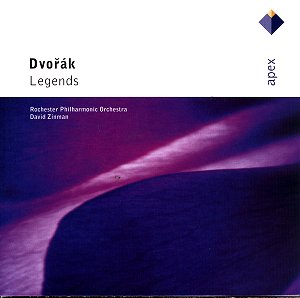Dvorak wrote his charming 'Legends' between December
1880 and March 1881 for piano duet, orchestrating them later in 1881.
This was as the result of a request from his publisher, Simrock, as
follow-up works to the 'Slavonic Dances'. They should really be heard
more frequently, for they are full of evocative charm, but for some
reason they have not established anything like a firm hold in the repertoire.
Some of them would make delightful encores (and a refreshing change
from the 'Slavonic Dances' mentioned above!).
Issuing the 'Legends' on their own on a single disc,
even at super-budget price, however, is surely a mistake. With a total
playing time of less than 42 minutes, these had better be exceptional
performances: unfortunately, in the event, they are really rather routine.
Originally issued in 1984 by Elektra/Asylum/Nonesuch,
it is difficult to see who Warner are aiming at in their marketing strategy,
given the competition. Far more rewarding encounters lie elsewhere.
Kubelik, hardly surprisingly given his proclivity for this composer's
music, is available twice: on Testament SBT1181 (Philharmonia Orchestra)
and on DG 453 025-2, a 1976 recording with the ECO coupled on a twofer
with a performance of the much-underrated Stabat mater (DG 453 025-2:
for more on the 'Stabat mater', see my review of a live performance
at London's Queen Elizabeth Hall in the 'Seen & Heard' part of this
site). The indefatigable Ivan Fischer with his Budapest Festival Orchestra
is superb on Philips 464 647-2, in a much better filled disc which also
includes the beautiful Notturno in B and the Prague Waltzes.
The New York-based Rochester Philharmonic Orchestra
was founded by George Eastman in 1922. Subsequent Music Directors have
included Eugene Goossens, Erich Leinsdorf and David Zinman (the conductor
of the present disc): Christopher Seaman is presently at the orchestra's
helm: for more details, see www.rpo.org.
Right from the opening statement of Legend No. 1 (Allegro,
in D minor), there is a literalism in evidence which precludes the necessary
evocation of the composer's homeland. Any vestiges of affectionate tenderness
are lacking, replaced instead by a well-drilled but emotionally crippled
interpretative stance characteristic of many second-league orchestras.
No. 2 in G needs a more
Dvořákian warmth and affection (No. 3 in G minor is similarly
afflicted). Legend No. 4 in C reveals the hardness of the recording
of levels of forte and above; it is also distinctly lacking in brio
when required; No. 5 in A flat demands more sensitivity to shifting
moods than is revealed here. No. 6 in C sharp minor seems more closely
attuned, although No. 7 in A seems too short for its own good. No. 8
in F sits on the music's surface rather, and the wind solos seem to
cry out for players of more individual character than the Rochester
Philharmonic's principals; No. 9 in D needs more bounce. The final Legend
in B flat minor goes some way towards the requisite nostalgia, without
quite getting there.
Disappointing, despite the price tag.
Colin Clarke


